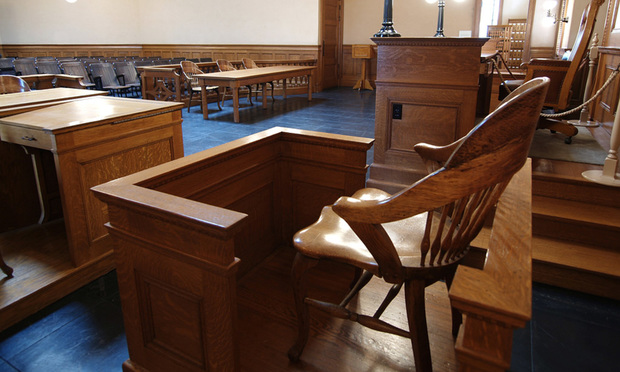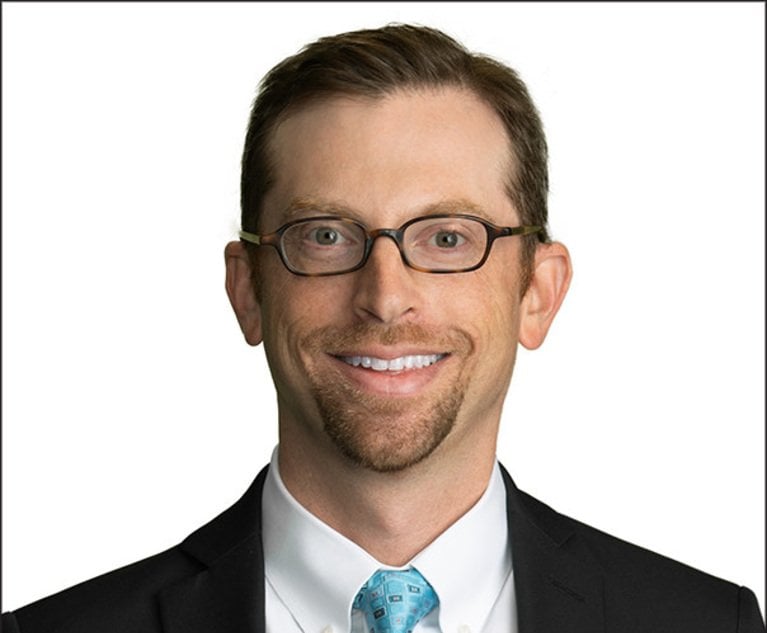Expert Properly Questioned on School Suspension 30 Years Ago, Panel Rules
Bronx Supreme Court Justice Howard Sherman “properly permitted” counsel for defendant Sally Abouel-Ela to cross-examine the witness about his chiropractic school suspension “for falsely reporting that he had seen patients.”
October 25, 2017 at 12:23 PM
3 minute read

A state appeals court has ruled that a trial judge properly allowed a defendant's counsel to cross-examine the plaintiff's expert rebuttal witness about his suspension from chiropractic school 30 years ago—because the information went to the expert's credibility and he “opened the door” to the topic via his testimony.
“The witness opened the door to its relevancy by claiming that his expert knowledge of biomechanics came, in part, from his training as a chiropractor,” wrote a unanimous Appellate Division, First Department, panel in an opinion issued Tuesday.
The panel ruled that Bronx Supreme Court Justice Howard Sherman “properly permitted” counsel for defendant Sally Abouel-Ela, who went through a car accident personal injury trial in 2016, to cross-examine the witness about his chiropractic school suspension “for falsely reporting that he had seen patients,” the panel decided.
The suspension was “a matter relevant to his credibility,” said Justices Dianne Renwick, Barbara Kapnick, Ellen Gesmer and Cynthia Kern in an unsigned opinion in Montas v. Abouel-Ela, 305620/10.
Plaintiff Lazaro Montas had alleged severe and permanent personal injuries “caused wholly and solely by reason of negligence of the defendant” after their cars collided on March 19, 2010, according to a lawsuit complaint.
Montas, represented by Eitan Ogen of Ogen & Sedaghati in Manhattan, sought damages. In early 2016, a nine-day jury trial ensued.
Abouel-Ela, represented by Tim Jones, an attorney at Picciano & Scahill in Bethpage, won a full defense verdict.
On appeal, Montas claimed Jones had made derogatory comments during trial about Montas' expert rebuttal witness that went beyond the boundaries of acceptable argument. Jones had said that the witness cheated 30 years ago to bring in money and now was giving false expert testimony to reap money again, according to Ogen.
But the panel disagreed that a line had been crossed.
“Counsel's comments about the plaintiff's expert in summations were within the broad bounds of rhetorical comment,” it wrote, citing Selzer v. New York City Tr. Auth., 100 AD3d 157, 163 (1st Dept 2012).
“In any event, the purportedly offensive comments did not 'create a climate of hostility that so obscured the issues as to have made the trial unfair,” the panel also noted, quoting Wilson v. City of New York, 65 AD3d 906, 908 (1st Dept 2009).
Ogen said on Wednesday, in a phone interview, that he was disagreed with the panel's analysis of the issues.
“I think they're reasoning [in allowing cross-examination directed at the school suspension] was all about the credibility,” he said. “It just seems like there has to be a line drawn somewhere. Even criminal acts are sometimes precluded if they're too remote in time, let alone something from 30 years ago that is a non-criminal alleged act.”
He added that it was his team's position that allowing the cross-examination “would open the floodgates to questioning experts about their high school and college peccadilloes and minor infractions and make the trials about that, rather than the main issues at trial.”
Moreover, he noted, “the expert in question was brought in to rebut the defense biomechanical witness and had nothing to do with chiropractic treatment.”
He also said that he and his client were “considering our appeal options to the Court of Appeals.”
Defense counsel Jones could not be reached for comment.
This content has been archived. It is available through our partners, LexisNexis® and Bloomberg Law.
To view this content, please continue to their sites.
Not a Lexis Subscriber?
Subscribe Now
Not a Bloomberg Law Subscriber?
Subscribe Now
NOT FOR REPRINT
© 2025 ALM Global, LLC, All Rights Reserved. Request academic re-use from www.copyright.com. All other uses, submit a request to [email protected]. For more information visit Asset & Logo Licensing.
You Might Like
View All
Fusion Voting and Its Impact on the Upcoming Election

Trending Stories
Who Got The Work
J. Brugh Lower of Gibbons has entered an appearance for industrial equipment supplier Devco Corporation in a pending trademark infringement lawsuit. The suit, accusing the defendant of selling knock-off Graco products, was filed Dec. 18 in New Jersey District Court by Rivkin Radler on behalf of Graco Inc. and Graco Minnesota. The case, assigned to U.S. District Judge Zahid N. Quraishi, is 3:24-cv-11294, Graco Inc. et al v. Devco Corporation.
Who Got The Work
Rebecca Maller-Stein and Kent A. Yalowitz of Arnold & Porter Kaye Scholer have entered their appearances for Hanaco Venture Capital and its executives, Lior Prosor and David Frankel, in a pending securities lawsuit. The action, filed on Dec. 24 in New York Southern District Court by Zell, Aron & Co. on behalf of Goldeneye Advisors, accuses the defendants of negligently and fraudulently managing the plaintiff's $1 million investment. The case, assigned to U.S. District Judge Vernon S. Broderick, is 1:24-cv-09918, Goldeneye Advisors, LLC v. Hanaco Venture Capital, Ltd. et al.
Who Got The Work
Attorneys from A&O Shearman has stepped in as defense counsel for Toronto-Dominion Bank and other defendants in a pending securities class action. The suit, filed Dec. 11 in New York Southern District Court by Bleichmar Fonti & Auld, accuses the defendants of concealing the bank's 'pervasive' deficiencies in regards to its compliance with the Bank Secrecy Act and the quality of its anti-money laundering controls. The case, assigned to U.S. District Judge Arun Subramanian, is 1:24-cv-09445, Gonzalez v. The Toronto-Dominion Bank et al.
Who Got The Work
Crown Castle International, a Pennsylvania company providing shared communications infrastructure, has turned to Luke D. Wolf of Gordon Rees Scully Mansukhani to fend off a pending breach-of-contract lawsuit. The court action, filed Nov. 25 in Michigan Eastern District Court by Hooper Hathaway PC on behalf of The Town Residences LLC, accuses Crown Castle of failing to transfer approximately $30,000 in utility payments from T-Mobile in breach of a roof-top lease and assignment agreement. The case, assigned to U.S. District Judge Susan K. Declercq, is 2:24-cv-13131, The Town Residences LLC v. T-Mobile US, Inc. et al.
Who Got The Work
Wilfred P. Coronato and Daniel M. Schwartz of McCarter & English have stepped in as defense counsel to Electrolux Home Products Inc. in a pending product liability lawsuit. The court action, filed Nov. 26 in New York Eastern District Court by Poulos Lopiccolo PC and Nagel Rice LLP on behalf of David Stern, alleges that the defendant's refrigerators’ drawers and shelving repeatedly break and fall apart within months after purchase. The case, assigned to U.S. District Judge Joan M. Azrack, is 2:24-cv-08204, Stern v. Electrolux Home Products, Inc.
Featured Firms
Law Offices of Gary Martin Hays & Associates, P.C.
(470) 294-1674
Law Offices of Mark E. Salomone
(857) 444-6468
Smith & Hassler
(713) 739-1250








